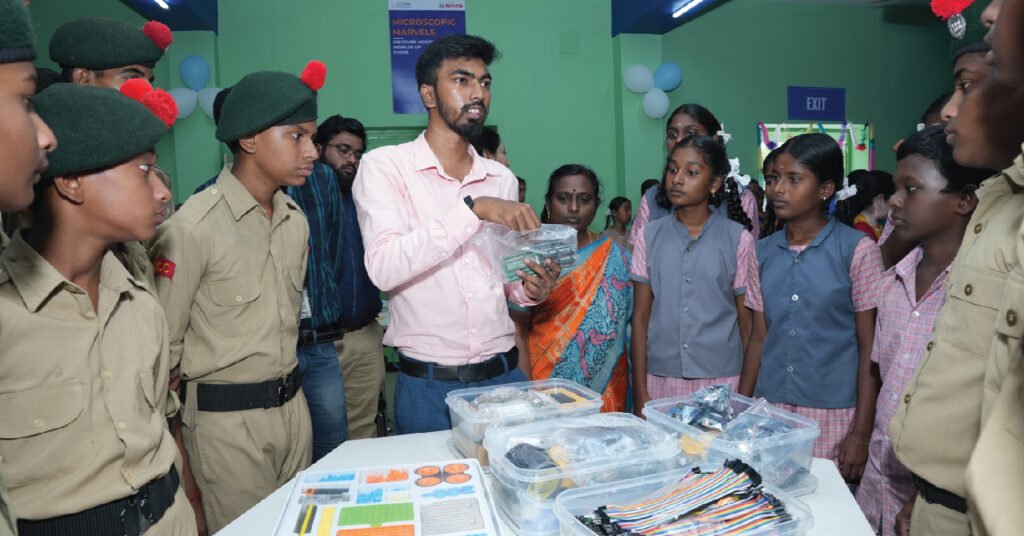CSR, or corporate social responsibility, has grown to be a powerful worldwide force for good. One of the key industries where CSR initiatives have had a lasting impact is education. Driven by a sense of obligation and commitment to the community, CSR education projects are transforming the educational landscape by enabling equitable access to education and enabling those who require it most to gain skills and knowledge. In this essay, we examine the importance of CSR education programs and how they contribute to a brighter future.
In essence, corporate social responsibility (CSR) is a business’s promise to improve society in addition to its main economic activities. Owing to its pivotal role in the progression of civilizations and human growth, education is a primary area of emphasis for several corporate social responsibility initiatives. Beyond financial contributions, CSR education efforts involve active engagement, partnerships with academic institutions, and a sincere commitment to guaranteeing that everyone, especially the marginalized and disadvantaged, has access to high-quality education. The Foundation of CSR Education Programs.
CSR Programs by India STEM Foundation
The India STEM Foundation, with the help of CSR programs, aims to enhance STEM education in the nation. Its main goal is to motivate youth to specialize in STEM fields—science, technology, engineering, and maths. By giving young people the tools and chances to study and succeed in STEM subjects, the foundation hopes to develop young minds through a range of programs, lectures, and events. Their efforts are crucial in forming India’s future and producing a new generation of creative problem solvers.
The India STEM Foundation’s CSR program is called STEM Tinkering Lab at ROBO Siksha Kendra.
The goal of the Robo Siksha Kendra is to improve society via STEM tinkering, robotics, AI, and scientific lab programs, which in turn empower the next generation of innovators and problem solvers. As we work together to construct these labs, watch the STEM revolution unfold. It is in line with the Samagra Shiksha Abhiyan, Atal Innovation Mission, and NEP 2020.
Gyanoday: Assistance with STEM Education
The Gyanoday program offers extra science and math teaching for grades 9 through 12, encouraging students to pursue higher STEM degrees.
Anushikshan: Acquisition of Skills
With the Anushikshan project, we give educators and students digital and 21st-century capabilities. Students may narrow the skills gap and prepare for the challenges of the future with Anishikshan.
Sanrachna: Assistance for Infrastructure
We transform educational institutions by supplying necessary infrastructure through the Sanrachna initiative, including smart classrooms, libraries, solar power, and more.
Essential Elements of CSR Education Initiatives
By providing resources, scholarships, and mentorship to impoverished kids, CSR aims to close the achievement gap. With the help of infrastructure development and resource availability, these projects aim to raise teaching quality and improve teachers’ ability to successfully motivate and mentor pupils. By guaranteeing access to technology and internet connectivity—both necessary for modern education—they foster digital literacy. They place a high priority on inclusive education, offering kids with special needs specialized help and promoting inclusion and equality.
Improving Educational Opportunity Parity: By providing resources, scholarships, and mentorship programs to kids in underprivileged communities, CSR projects aim to bridge the achievement gap. These initiatives seek to give underprivileged pupils opportunities for a better future and to level the playing field.
Enhancing the Quality of Instruction: Through the provision of learning resources, teacher preparation, and infrastructure development, corporate social responsibility programs aim to raise educational standards. Giving educators the materials and tools they need helps them mentor and inspire their pupils in an efficient manner, which raises the standard of instruction as a whole.
Promoting Computer Literacy: Success in the digital age requires digital literacy. In order to guarantee that children have access to contemporary education, CSR initiatives frequently entail supplying technology and internet connectivity to schools located in rural regions. Encouraging digital literacy gives pupils the tools they need to prosper in a world that is becoming more and more digital.
Outside of the Classroom: Beyond typical classroom settings, CSR activities promote skill development and vocational training programs that assist students improve their talents and get ready for the workforce. The goal of these programs is to provide students the information and skills they need to succeed in the workforce.
Encouraging Education for Special Needs: In order to guarantee that no student is left behind, CSR education projects place a high priority on offering specialized infrastructure, resources, and assistance to kids with special needs. Through attending to the special needs of students with disabilities, these initiatives advance equality and inclusivity in education.
Progress due to CSR Education Initiatives
Better Academic Results: Test results and participant academic performance may be analyzed to determine the success of the programs and how well they have improved learning outcomes.
Higher Enrollment: A noteworthy accomplishment is demonstrated by an increase in the number of students choosing to register in programs for vocational training or higher education, demonstrating the initiatives’ accessibility and popularity.
Job Outcomes: Tracking program alumni’ career options provides valuable information about how well their employment choices complement their academic pursuits, demonstrating the programs’ applicability and effectiveness in educating students for the workforce.
Community Development: Building a culture of learning and growth within the communities that CSR education programs serve is an important aspect of their success. This larger effect supports the general growth of these societies and extends beyond individual accomplishments.
To Sum Up, Globally, Corporate Social Responsibility (CSR) programs greatly support education by promoting fair access and skill development. Through initiatives like the STEM Tinkering Lab at ROBO Siksha Kendra, organizations like the India STEM Foundation’s STEM-focused CSR activities support STEM education in India. Initiatives such as Gyanoday improve STEM education for grades 9–12, while Anushikshan provides teachers and students with digital literacy. The Sanrachna project improves the facilities of schools. The goals of CSR education programs are to close educational gaps, improve instruction, encourage digital literacy, offer career training, and assist special needs education. Improvements in academic performance, higher enrolment, employment results, and community development are used to gauge their influence.




